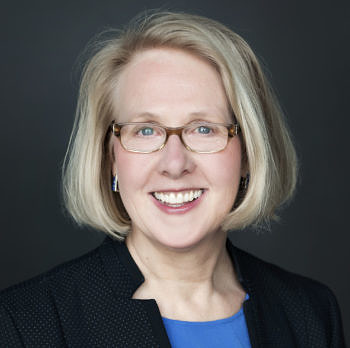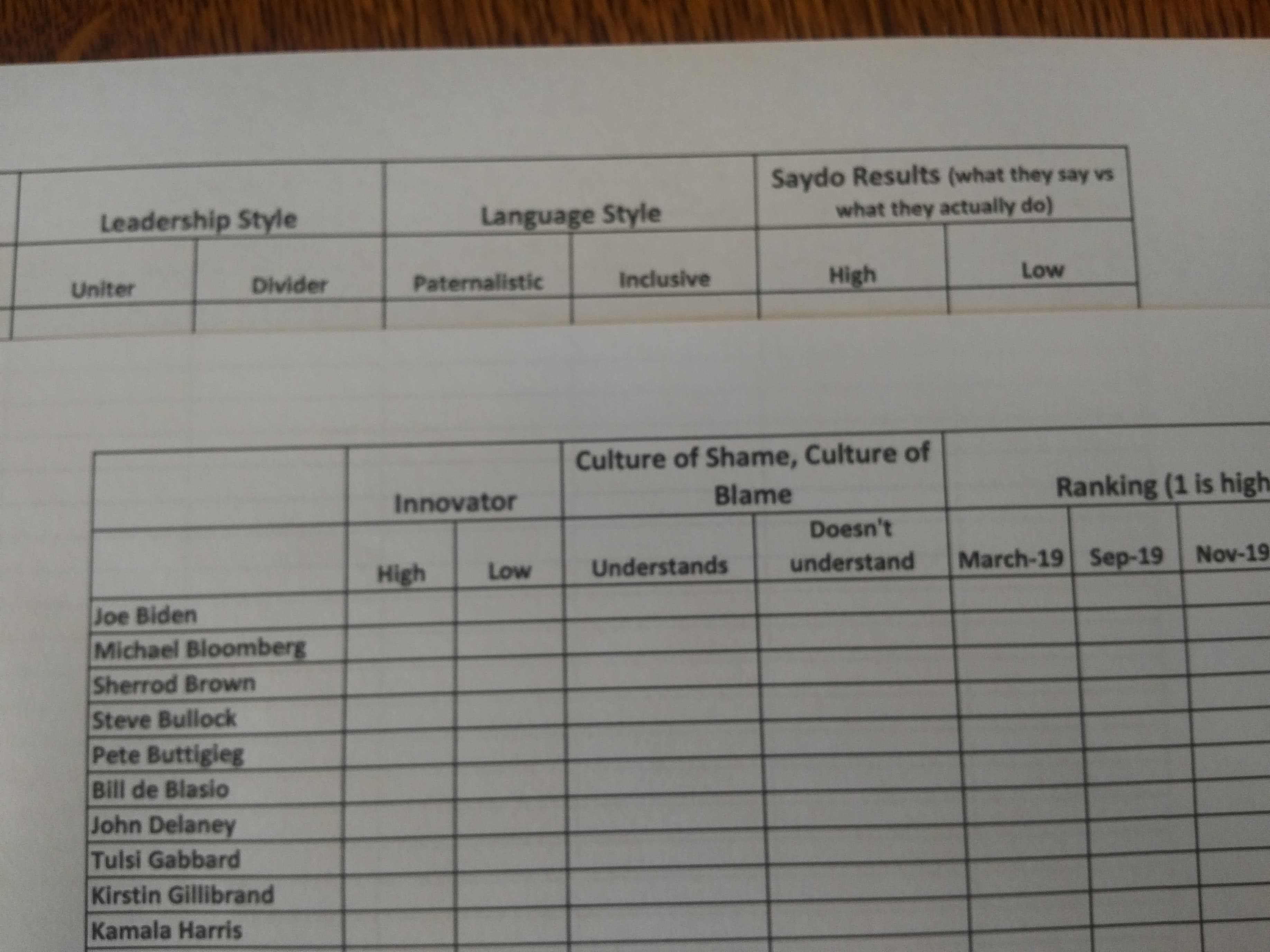Longtime Democratic campaign staffer and candidate consultant Julie Stauch follows up on her last commentary about qualities she’s seeking in a presidential contender. -promoted by Laura Belin
Friends who live in other states have asked me, “How do you decide who to support for president in a crowded caucus (primary) field?” The answer is often, “It depends upon the year.” In a year like 2020, we’re seeing a diverse, talent-laden field of candidates. Here’s part of how I narrow the crowded field.
Let’s pretend that the presidential year is your home. When a Democrat announces they are running for president, they automatically get into the house and are shown to the basement. In order to get out of the basement they have to demonstrate other characteristics.
For me, I’m not that interested in a litmus test of 58 issues. I’m much more interested in character and leadership style. Why? Because elected leaders deal with thousands of issues, but their approach to solving problems is driven by their character and leadership style. I can accept that we won’t agree on every issue as long as I understand their approach.
Tracking a variety of conversations on Facebook, in-person or informally at a restaurant or coffee shop, many people are saying they are only going to caucus for a winner. Here’s the challenge with making that your criteria: no one can predict a winner for president until AFTER they’ve won. Which means the only possible candidate on the ballot who will have actually won a presidential race is Trump. (Right. I’m not going to support him either.)
Another technique is to get picky and eliminate candidates for a series of reasons. Yes, I do that, and there are a couple of candidates who won’t get my support unless they win the Democratic nomination. But again, that’s not very helpful. Yes, it reduces the field, but not in a manner that is proactive, positive and looks to the future.
As written in a piece Bleeding Heartland published last month, I am seeking an innovator who has successfully achieved results at a large scale. I want an experienced innovator as our next president because we’re going to need it to both clean up what has been damaged by the Republicans and Trump, but more importantly to get us on track to deal with the challenges we face on so many levels.
While I’m definitely looking for an innovator, there are easily at least five candidates who meet that criteria without a lot of research. Once more information is gathered it will likely be as many as eight candidates. So how to sort further? Here are a few other critical factors I assess.
What’s their leadership style? Are they a uniter? Or a divider? I want someone who will unite our party and our country behind their candidacy. As an Iowan, I’m not alone in that sentiment. A recent Emerson College poll of Iowans had only one useful piece of information in it as far as I was concerned. They asked a series of questions on characteristics of a candidate for President. This was asked of all political affiliations and 78 percent want a candidate “who will work with members of the other party and compromise to get things done.” Among just Democrat caucus attendees the percentage is 86 percent. So, whether you’re talking Democratic caucus attendees or Iowa voters as a whole, they all agree that we need a unifier in the White House, not a divider. Pay attention to this!
What’s the tone of their speech? Are they paternalistic? By that I mean are they inclined to say things like “Day one I’m going to …” or “I will fight for…” and take on the burden of our country as only their burden. Or, are they empowering and inclusive? “We can work together to solve…” or “As your president, I will work with you to end…” My preference will always be empowerment and inclusion because a democracy is for all the people. We should not make the president the sole person to take responsibility for our societal problems. Think John F. Kennedy and his “Ask not what your country can do for you. Ask what you can do for your country.” We need a president who will lead us but not do our work for us. We all have to be a part of making America stronger.
What’s their say-do ratio? A former supervisor talked about the Say-do ratio. When I first heard it I asked, “Is that a Japanese model for assessing someone?” She looked at me like I was an idiot and spoke slowly to me, “No, it’s what you say vs what you do. If the say and do are equally high, then you have a high say-do ratio, which means you deliver the results you promise.” DUH. I want a presidential candidate with a high say-do ratio. We need that reliability and follow through, especially as we recover from the whiplash of tweets. Getting elected is the start of the job, not the end. Those with a high say-do ratio will work from day one all the way to the last day on the job.
Do they understand the culture of shame, culture of blame that is rampant in our country? In the very last years of his life, my father shared with me his lifelong burden of shame. Due to his father’s Parkinson’s disease and inability to work, his family lost the farm when he was a child during the Great Depression. Dad described it to me as being, “on the dole” a reference to people who took money from the government in order to meet basic needs. He hated it so much that he never spoke of it until he was in his 70s.
Dad was one of the most liberal people I know, so to say I was astonished by his views is a gross understatement. He supported and valued welfare programs and other government programs for the help they provided, but at the same time he did not want to take part in those programs EVER AGAIN. To him it was shaming to do so. He was open to Social Security because it was available to everyone and because he contributed to the fund from his work. From my Dad’s experience, the culture of shame is part of the pride of working families who have a sense of autonomy and independence and don’t want to ask anyone for help.
When sharing the culture of shame concept with a former colleague, he pointed out that Trump is a master of the culture of blame. If something is not right in your work or world, Trump will tell you that this is the fault of _______ (insert immigrants, minorities, large corporations, etc.) My former colleague is right. One side of the coin is the culture of shame, the other is the culture of blame. Our presidential candidates, and ultimately the nominee, must understand this culture and how it impacts voting decisions. It is critical!
Any candidate who is an innovator with a high say-do ratio, who unites and empowers us, who understands the culture of shame and avoids the blame game, those are the candidates who will make my short list. Then, like everyone else, I’ll make an emotional decision on who I like best. After all, it’s easiest to follow a leader you like.
Editor’s note: Julie Stauch provided this picture of her spreadsheet and indicated she would be willing to share a copy (.xls format) with interested readers.


